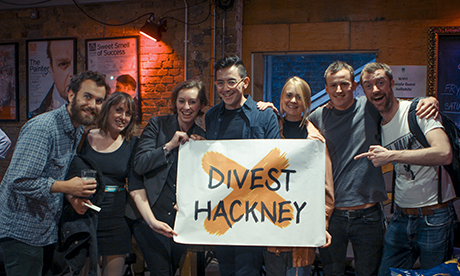Everyone in Hackney can help tackle climate change, divestment experts urge

Fighting fire: experts and residents talk tackling climate change. Photograph: Chris Venables
Energy experts stoked the fire of the divestment debate on Sunday as they discussed Hackney’s multimillion-pound investment in fossil fuels.
Hackney Council has poured £42m into the oil, gas and coal industry through its pension fund. But the borough’s Pensions Committee, facing increasing local pressure, recently announced it would review its investments in fossil fuels.
In anticipation of this promising step, campaign group Divest Hackney, the Hackney Citizen and the Arcola, which is on track to become the world’s first carbon-neutral theatre, invited leading thinkers to discuss divestment.
On the panel was James Randerson, the Guardian‘s assistant national news editor, who specialises in environment news; Luke Sussams from Carbon Tracker; Catherine Howarth from responsible investment charity ShareAction; Danielle Paffard representing divestment campaign group 350.org; and Dr David McCoy from Medact.
Empowering individuals
Catherine Howarth and Danielle Paffard said campaigning on the investment system provides citizens an opportunity to fight climate change.
“I don’t feel that powerful to influence the government’s position in climate change negotiations, but I do feel empowered to influence what happens with my pension savings,” said Howarth.
Hackney Council is one of the largest employers in the borough. Under the government’s new scheme to oblige employers to provide private pensions for their employees, thousands of Hackney residents have recently been enrolled on pensions plans with carbon investments.
Paffard said: “Divestment is a challenge to the wealthiest, most powerful industry that has ever existed.”
“It lets individuals and institutions lead where politics has failed.”

Hackney council pension fund divestment debate. Photograph: Chris Venables
Money talks
The panel turned to the financial merits of divesting from fossil fuels. They said investment portfolios that are low-carbon have done much better in recent years than those that are high-carbon.
Research recently published by campaign group Platform revealed millions of public sector staff would be better off had their pension funds been divested from fossil fuels.
But divesting doesn’t just save money for the pension owners, it also avoids wasting money on potentially redundant fuel. “It’s crazy to spend money on finding new reserves which we may never be able to burn,” said Randerson.
International experts agree the earth must not warm by more than 2°C if we are to avoid dangerous climate-change impacts, meaning we may not be able to burn fuels currently being extracted.
“The business model of fossil fuel companies is unacceptable,” Randerson added.
Ecological collapse
Diane Abbott, Hackney MP and shadow secretary of state for international development, enjoined people to think about the global effects of climate change. She suggested campaigners give divestment stories a human face by linking them to the plight of those in countries likely to suffer the most from climate change.
McCoy went further still, stressing the urgency of the need to act on global warming, saying: “The world is on the edge of ecological collapse.”
Shot in the arm
Bill McKibben, the 350.org founder, explained to the audience via videolink why the divestment campaign is so urgent.
He said since financial analysts published a report demonstrating that the fossil fuel industry had in its reserve about five times as much carbon as any scientist thinks we can safely burn, huge funds subsequently divested, including the Rockefeller family, universities, the Church of England and the two biggest State of California pension funds.
McKibben said: “Having the first local council in the UK to divest would be a big shot in the arm to this campaign.”
Review criteria
During the Q&A session an audience member, Chris, asked what the criteria should be for a robust review by Hackney Council’s pensions committee.
McCoy called for the committee to base its review on climate science. Howarth said they should use the Environment Agency Pension Fund’s new climate change strategy as a benchmark, while Paffard stressed the importance of involving a “consultation with members”.
